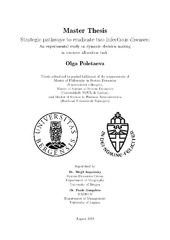| dc.description.abstract | In such areas like infectious diseases management, resource allocation strategies are crucial, as they determine the livelihoods of people both in the short-term and in the long-term. Often, a specific geographic area is affected by several diseases that create a heavy burden on the society. As resources are usually limited, allocating resources, for example, to fund vaccination activities, becomes highly important and full of trade-offs. With managing infectious diseases there are multiple decisions that need to take place, the results of which will affect the situation in the future. Being demanding in general, dynamic decision making in such a domain becomes even more complex as there are people’s lives at stake. Arriving at the understanding of how people will behave in such situations through field experiments is not only costly but also unethical. System dynamics-based simulators proved to be fruitful in the experimental research in dynamic decision making. The novelty of this research is in its application of a system dynamics-based simulator in an experimental setting to investigate the general strategic choices people make when they need to eradicate two competing diseases with a limited financial resource. In addition, the research strives to shed light on the possible reasons to why people do not pursue eradication strategy. The results provide an empirical evidence on the four general clusters of allocation strategies, with the majority of subjects who did not pursue eradication. One of the explanations for such performance is that even in the sparing conditions of the game, the context of the problem was too demanding for the subjects to correctly infer the results of their actions, use the provided information and based on that infer which strategy would lead to eradication. Further research should concentrate on assessing subjects’ understanding of the underlying system and its effect on their decisions as well as testing a broader range of dynamic decisions in the simulator. | en_US |
